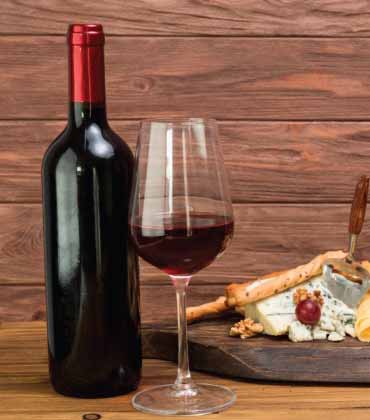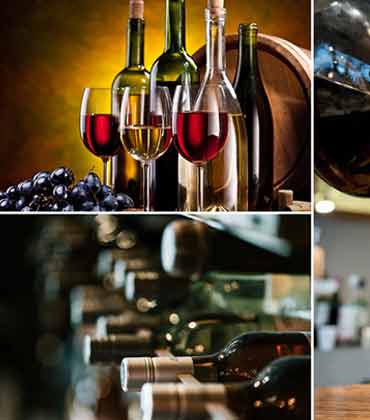THANK YOU FOR SUBSCRIBING
By Angelos Kyrousis, Director of Food and Beverage, Virgin Hotels
Exploring the art of Wine and Food Pairing: A Gateway to...
By Leandro Moretti, Research and Development Director, Marley Spoon
The Rise of Wine Tourism in Europe
By Riaz Ahamadeen, Vice President of Quality/Food Safety & Regulatory – North America, Oatly
Defending the Plate: Strategies to Combat Foodborne...

How European Wineries are Blending Tradition with Sustainability
Aoife Murphy, Winery Operations Manager,Glanbia

 Aoife Murphy, Winery Operations Manager,Glanbia
Aoife Murphy, Winery Operations Manager,GlanbiaEurope's wine industry is thriving due to sustainability initiatives like organic certification, biodynamic farming, renewable energy, digital transformation, and the "Farm to Fork" campaign, resulting in a 17 per cent annual growth rate.
Throughout the rich history of Europe's wineries, a captivating narrative of timeless romance has been woven—a tale of ancient stone cellars steeped in heritage and sprawling vineyards bathed in moonlight. Yet, amidst this rustic allure lies a subtle yet profound transformation fueled by the relentless tide of digital innovation. For millennia, the rolling hills of Europe have cradled grapevines, nurturing an industry steeped in tradition and culture. However, as the landscape evolves, the imperative for sustainability resonates ever more deeply across these vine-clad landscapes.
Winemakers across Europe now stand at the vanguard of this evolution, embracing innovation as they endeavour to diminish their environmental footprint, conserve resources, and enhance soil quality. The need for sustainability has become increasingly apparent within vineyards, prompting a collective raising of glasses among winemakers, heralding a new era of methods designed to harmonise tradition with environmental stewardship.
The landscape of viticulture in Europe has undergone a significant shift away from chemical dependency, embracing natural alternatives in place of artificial pesticides and herbicides. This transition has been notably led by an increased adoption of organic certification, resulting in a remarkable annual growth rate of 17 per cent in the area dedicated to organic viticulture. This transformation has yielded numerous benefits, including improved biodiversity, enhanced soil health, and the production of wines that authentically encapsulate their unique terroir.
Moreover, this movement transcends a mere rejection of chemical inputs. Biodynamic farming represents a pioneering approach to eco-conscious viticulture, fostering thriving vineyards where biodiversity thrives. Ladybugs actively control aphid populations, cover crops nourish the soil, and vineyard activities such as pruning and harvesting are meticulously guided by celestial rhythms. This holistic methodology contributes to the creation of wines imbued with distinctive character and also bolsters grape quality and supports the development of ecosystems.
While traditionally appealing, the conventional glass bottle poses environmental challenges. However, innovative solutions have emerged within the winery industry. These include the exploration of recyclable, lighter glass bottles, a transition towards aluminium cans—surprisingly effective in recycling—and the investigation of bioplastics derived from plant materials. The results have been remarkable: a reduction in waste generation and carbon emissions. Moreover, these changes offer environmentally conscious consumers the opportunity to indulge in guilt-free treats, aligning with their sustainability values.
The contemporary shift towards renewable energies signifies a pivotal transition away from fossil fuels within various industries. Wineries, as part of this movement, are increasingly adopting sustainable practices by harnessing solar, wind, and geothermal energy to power their operations. This innovative approach involves the installation of solar panels on rooftops, the integration of wind turbines to capitalise on natural breezes, and the implementation of inventive solutions such as utilising grape pomace in biomass boilers to generate heat and power.
The adoption of renewable energy sources within the winery sector underscores its dedication to fostering a more environmentally sustainable future. Simultaneously, this transition significantly curtails greenhouse gas emissions while bolstering the promotion of energy autonomy. Such initiatives contribute to a greener ethos and also serve as a testament to the sector's commitment to reducing its carbon footprint and embracing sustainable energy alternatives.
The Future of European Wine
The ongoing digital transformation within European wineries isn't just a response to necessity; it's a prevailing trend that's reshaping their landscape. Embracing technology isn't merely a choice for these esteemed institutions; it's a pivotal strategy enabling them to thrive. By leveraging tech, they captivate fresh audiences, optimise operations, and safeguard their heritage, merging tradition seamlessly with modernity. This shift promises a new era of European wines—innovative, sustainable, honouring both land and winemaking artistry.
European wineries have strategically integrated digital solutions to elevate customer experiences, streamline operational efficiencies, and maximise production yields. Through the adoption of augmented reality overlays, virtual reality headsets, chatbots, AI-driven recommendation engines, interactive quizzes, and personalised labelling, the landscape of wine tastings has evolved into immersive and unforgettable encounters.
Furthermore, the implementation of digital tools extends to the optimisation of winemaking processes, leveraging sensors, drones, IoT devices, and precision agriculture methodologies. This technological integration facilitates automated robotic systems and harnesses blockchain technology to ensure comprehensive transparency within the entirety of the supply chain.
Notably, these advancements align with sustainability objectives, as smart irrigation systems are employed to curtail water consumption, while energy-efficient technologies are embraced in both production and storage. Consequently, these concerted efforts towards digitalisation enhance the industry's competitiveness and also contribute significantly to sustainable practices within winemaking.
In addition, sustainable winemaking represents a fundamental paradigm shift in the industry, not a minor adjustment. Once a specialised niche, sustainability has become a prevailing trend driven by consumers' ethical and environmental values. European wineries lead the way, setting benchmarks for environmental sustainability. Their adoption of solar-powered cellars and organic grape cultivation showcases a delightful fusion of taste and conscientiousness, solidifying their role as trailblazers in crafting wines that honour both palate and planet.
Innovation in viticulture extends beyond individual wineries as European nations are fostering collaborative efforts to promote and incentivize sustainable practices within the wine industry. The EU's "Farm to Fork" strategy underscores the importance of environmentally responsible viticulture, complemented by initiatives like the European Sustainable Wines campaign. Wineries are spearheading a collective shift towards a more eco-conscious future by actively engaging in the exchange of best practices and mutual learning, thereby championing an environmentally friendly trajectory for the industry as a whole.
Read Also















